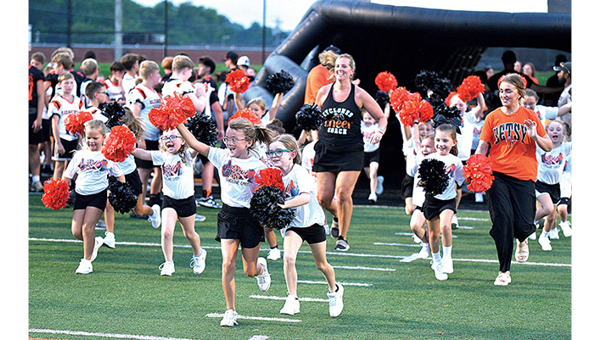From the Nightclub to the Altar: The Journey of Earnest “Big Ernie” Peters
Published 1:55 pm Tuesday, April 8, 2025





|
Getting your Trinity Audio player ready...
|
By C.Y. Peters
Born in the quiet hills of Peters Hollow, Earnest “Big Ernie” Peters was never meant for an ordinary life. From a young age, he stood out — not just for his towering frame and booming voice — but for a spirit that was as bold as it was kind. His story is one that traveled through football fields, military bases, boxing rings, nightclubs and, finally, into the sanctuaries of East Tennessee churches. It’s a story of transformation, heart and the unwavering call of faith.
Ranger Roots
Ernie first made a name for himself under the Friday night lights of Unaka High School. From the mid-1950s through 1957, he was a hard-charging football player for the Unaka Rangers, leading them to memorable victories over rivals Cloudland, Happy Valley, Jonesboro and Johnson County. Even a 6-6 tie with powerhouse Hampton felt like a win when Big Ernie was in the game.
Trending
He played under coaching legend Lynn Goddard, then in his eighth season, and alongside teammates like his brother Jerry Peters and Shona Lowe. Ernie was more than a player — he was a leader, a motivator and a powerhouse on the field.
From Airplanes to Uppercuts
After high school, Ernie traded his football cleats for combat boots, joining the U.S. Air Force. For four years, he served his country as an airplane mechanic, sharpening his skills and discipline. But even with wrenches and turbines, he never lost his competitive edge.
When he returned home, he laced up a different kind of glove — boxing gloves. Big Ernie took to the ring as a Golden Gloves boxer, stepping into the spotlight on cards alongside Carl Ray Nidiffer and Joe Colbaugh. His presence in the ring was just as commanding as it had been on the gridiron.
Softball, Song and Southern Nights
In 1966, Ernie took his talents to the diamond, pitching for Union Hill Church’s softball team. He started out 3-1 that season, helping lead the team alongside slugger Wayne Christian, who batted an astounding .565. But sports weren’t his only calling.
By 1967, Ernie had picked up the sticks — not the baseball kind, but drumsticks — as a founding member of The Southern Kings, a local band that played everything from country classics to rock ’n’ roll rhythms. They were one of the first groups to ever play at Covered Bridge Days in Elizabethton and won the Battle of the Bands with a $50 prize and bragging rights to boot.
The Kings became a staple at local hotspots, none more iconic than Sam’s in Valley Forge, where they packed the house on Friday nights during the all-you-can-eat fish fry.
Trending
The Turning Point
The Southern Kings were nearing their 10-year anniversary in 1975 and had a major opportunity lined up: a performance on the Grand Ole Opry scheduled for March 22. But something changed.
Bandmate Donald Merritt experienced a personal spiritual awakening and left the group to dedicate his life to the church. His transformation sparked a revival among the rest of the band. During a stirring service at Little Milligan Baptist Church, the Matheson twins — Jim and John — along with Ronnie Campbell, also gave their lives to the Lord.
Suddenly, what had been a honky-tonk band became something entirely different.
From Southern Kings to Brotherhood Quartet
What followed was nothing short of divine orchestration. With the additions of Dennis Laws, rooted in gospel — The Southern Kings transformed into the Brotherhood Quartet. Ernie traded the nightclub stage for the church altar, playing the drums and singing bass with his new brothers in Christ.
Though Ernie jokingly said, “Dennis Bradley was the only one of us that could sing,” Bradley, the music leader at Braemar Baptist Church, helped each member find their harmony and purpose.
What started as occasional revival performances quickly turned into a full-blown ministry. By 1976, the Brotherhood Quartet was opening for Southern Gospel legends like The Inspirations and The Florida Boys, sharing their message through music across Tennessee and beyond. Their first album was recorded in September 1975.
When asked how the group balanced music and family, Ernie humbly replied, “Our wives are the backbone of the Brotherhood.” For Ernie, that meant Mary Alice “Bootie” Peters, his high school sweetheart and wife since 1960, who supported him every step of the way.
Together, Ernie and Mary raised three children — Steve, Mike and Melanie — instilling in them the same values of faith, hard work and service that defined Ernie’s life.
A Life Well Lived
Though he passed away in 2008, Earnest “Big Ernie” Peters left behind a legacy that continues to inspire those who knew him. He was a football star, a veteran, a boxer, a band leader and, most importantly, a faithful servant.
His journey — from the roaring crowds of football games and the buzzing excitement of nightclub gigs to the sacred stillness of small-town churches — was not just one of transformation, but of purpose.
From the nightclub to the altar, Big Ernie didn’t just find a stage — he found a calling.










